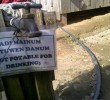CAGAYAN DE ORO—Dried and processed fruit and other foods produced by Mindanao firms can find a niche in the increasingly affluent Taiwan market, particularly if they adopt its packaging, labeling and certification standards.
This was among the findings of a half-day market survey of some Taipei retail outlets undertaken by Mindanao food exporters, who also joined the Taipei International Food Show last year.
“Mindanao food items in the stores we covered, such as dried mango, were superior or at least at par with products from other places, in terms of shape, texture and color,” said Amalia Datukan of the business growth team of USAid’s Growth with Equity in Mindanao (Gem) program.
“We noticed however that imports from other countries were mostly marked with HACCP, ISO or halal logos and certifications,” Datukan said, naming some of the most common global food safety standards.
The market tour was organized by the Gem program in partnership with the Department of Agriculture and the Department of Trade and Industry to expand exports of selected higher-value agricultural commodities from Mindanao.
The Gem program assists small and medium Mindanao food companies to join selected international trade fairs. Companies have reported actual sales of more than 20 million US dollars resulting from their Gem-assisted participation in eight international fairs.
Over the past decade, Taiwan’s population of 23 million has grown in purchasing power and openness to Western and Asian foods. These include fruit and marine items produced in Mindanao.
In addition, more than 90,000 Filipinos work in Taiwan, providing a ready market for these products.
Many of these Pinoy expats frequent EEC Elite Mart, which has more than 50 branches, including 20 in Taipei.
During the market spot-check, Mindanao visitors noticed that the chain carried a substantial number of Philippine food items, including canned sardines from Mindanao, noodles, fruit beverages and snacks.
A smaller but key outlet for food items is the Bing Go chain owned by a Filipino-Taiwanese couple. Bing Go’s four branches carry more than a thousand different products ranging from toiletry items to canned goods, almost all of them from the Philippines.
Fruit drinks and dried fruit have great potential, according to one retailer, who said that his Taiwanese buyers are waking up to the competitiveness of Philippine products in terms of quality and cost.
This reflected the trend at the Taiwan International Food Show, where fruit items were among the most sought-after Mindanao products. Buyers also showed interest in coffee and virgin coconut oil and its variants.
“Superstore” chain outlets visited during the market tour, such as RT Mart and Sogo Supermarket, carried dried mangoes from Mindanao.
“The dried fruit packaging appears to be up to Taiwan market standards,” said Datukan. “But we noted that items from other countries also had product labels translated into Chinese, which would entice more consumers to try unfamiliar foods.”
Other Mindanao exports to Taiwan include tropical fruit juices, fresh and processed pineapple, fruit mixtures, banana chips, canned tuna, seaweeds, desiccated coconut, and fresh or chilled asparagus.
Despite Taiwan’s market potential and proximity to the Philippines, it ranks 28th among Mindanao’s export destinations, based on Department of Trade and Industry records.
Its accession to the World Trade Organization (WTO) in early 2002 resulted in further market liberalization and import tariff reduction. Its growing retail industry is open to new food imports, providing an opportunity for Mindanao growers, processors and suppliers. (GEM)
IMPORTANT NOTICE: INBOX is an archive of press releases, statements, announcements, letters to the editors, and manifestos sent to Davao Today for publication. Please email your materials to davaotoday@gmail.com. Davao Today is not responsible for the content of these materials. The opinion expessed in these items does not reflect those of Davao Today and its staff. Please refer to our terms of use/disclaimer.










